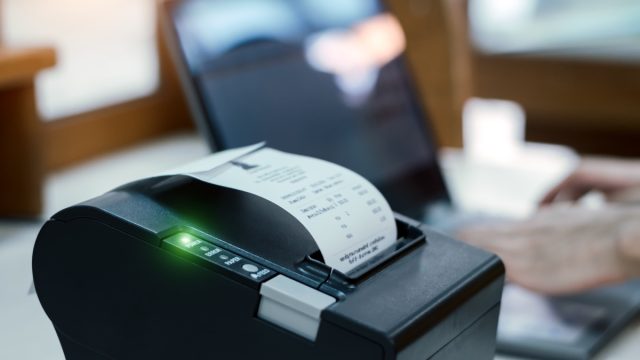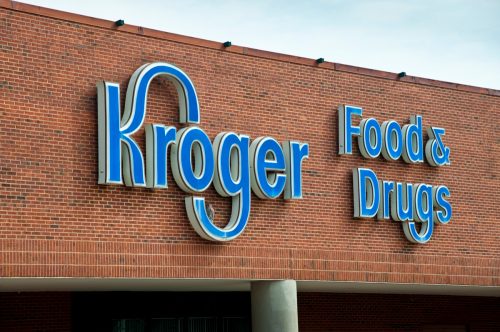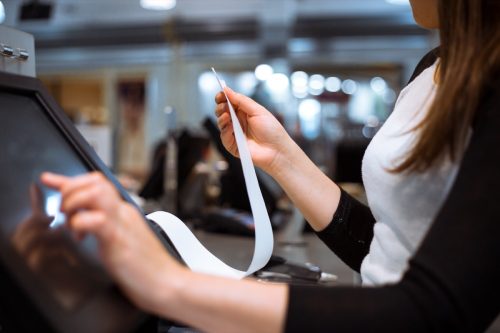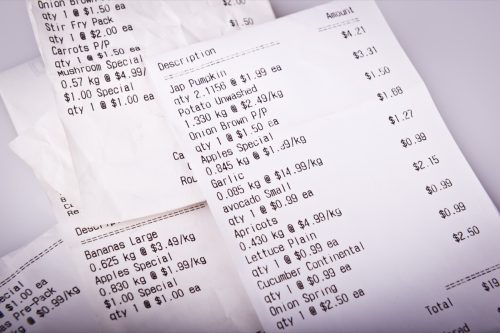Receipts From Stores Like Kroger and Home Depot Contain “Toxic Chemicals,” Report Says

Receipts are something we tend to collect, whether intentionally or not. Many of us save receipts for tax purposes or to keep track of spending, but it’s just as likely that we absentmindedly stuff them at the bottom of a purse or a jacket pocket. Either way, they can pile up fast—and that could come with surprising health consequences. According to a new study by the Ecology Center, you might want to think twice about holding on to your receipts from Kroger, Home Depot, and other major retailers, as they may contain “toxic chemicals.” Read on to find out more about this alarming study.
READ THIS NEXT: Dollar Tree Accused of “Endangering Everyone” Who Shops There.
Receipts were collected from 144 major retailers.

In a new study, the Ecology Center tested 374 paper receipts from 144 major retailers, collected between Jan. and Nov. 2022. Receipts came from 22 U.S. states and Washington, D.C., with the most receipts (87) collected from grocery stores like Kroger, Whole Foods, and Harris Teeter. Receipts were also collected from restaurants, big-box retailers, home improvement stores, convenience stores, clothing stores, discount stores, and drugstores, according to the study report.
Researchers were looking to detect bisphenols such as bisphenol A (BPA) and bisphenol S (BPS), both of which interfere with our hormones and have been linked to “numerous health harms, including cancer, birth defects, and other developmental issues,” Nancy Buermeyer, director of program & policy for Breast Cancer Prevention Partners, said in a press release.
According to the study report, receipts are an “underrecognized source” of “hormone-disrupting chemicals” like BPS and BPA. Receipts are made from thermal paper that’s coated in layers of chemicals, which allows text and images to form when heat is applied, per the Ecology Center.
Receipts from over 100 regional and national retailers contained BPS.

Overall, researchers found BPS in 80 percent of tested receipts, per the press release, while BPA was found “in very few receipts” (1 percent). These numbers were down from 2017, when researchers found BPS in 84 percent of tested receipts, and BPA in 9 percent of receipts. The press release notes that BPS is advertised as being “safer” than BPA, but both chemicals still pose health issues.
Approximately 129 retailers printed BPS-positive receipts, including Ace Hardware, Aldi, Dollar Tree, Dollar General, Family Dollar, Five Below, JCPenney, Kroger, Kohl’s, Lowe’s, Sam’s Club, Home Depot, Rite Aid, and Walmart. Receipts from delivery services such as the UPS Store, FedEx, and the United States Postal Service (USPS), also tested positive for BPS. A complete list of retailers with chemicals detected in their receipts can be found in the test results.
Best Life reached out to Kroger and Home Depot for comment on the report, and will update the story with their response.
READ THIS NEXT: Scientists Just Found a Surprising Connection Between Grocery Shopping and Dementia.
The numbers have declined.

Researchers found safer alternatives to bisphenols in 20 percent of receipts, which represented a sharp increase from the 2 percent detected in 2017. While the report cites this as “positive progress,” the toxic hazard of bisphenol is still fairly common. In addition to consumers, employees who regularly handle receipts (especially women) are at risk, the press release states, with advocates calling for reduced printing of receipts and increased digital options.
“Receipts are a common exposure route for hormone-disrupting bisphenols which readily absorb through the skin. Our studies show most retailers use bisphenol-coated receipt paper,” Melissa Cooper Sargent, environmental health advocate at the Ecology Center of Michigan, said in the press release. “Switching to non-toxic paper is an easy shift. We urge retailers to stop handing out chemical-laced paper to their consumers and putting employees at risk.”
Mike Schade, director of Mind the Store, a program of Toxic-Free Future, added, “No one should have to worry about toxic exposures from checking out at a store.”
Schade also stressed that this issue has persisted for over a decade. However, as illustrated by the declines in bisphenol use found in the Ecology Center study, change is possible. “We encourage retailers to step up to protect their customers from this unnecessary exposure,” he said.
Some retailers have already taken action.

According to the report, only Culver’s, a restaurant chain, was found to have uncoated receipts. However, receipts from 16 retailers were found to have non-bisphenol chemicals “that may be safer alternatives.” These retailers included Best Buy, Costco, CVS, H&M, HomeGoods, Lululemon, Marshalls, REI, Sam’s Club Gas, Sierra Trading Post, Starbucks, Target, T.J. Maxx, Trader Joe’s, and Whole Foods Market.
Several of these stores made efforts to remove bisphenols in recent years, per the Retailer Report Card, namely TJX Companies, Costco, REI, Target, Best Buy, and Whole Foods.
In response to the report, Walgreens also pledged to eliminate bisphenols and offer digital receipts at 9,000 stores by the end of this year. CVS, another drugstore chain, also stopped using phenol-coated paper in 2020 and increased digital and no-receipt options, the press release states.
Washington was the first state to propose a statewide ban on these chemicals in receipts, with the policy going into effect in Jan. 2025. California has also introduced legislation requiring retailers to provide digital receipts and phenol-free receipts upon request.
RELATED: For more up-to-date information, sign up for our daily newsletter.
Be proactive to protect yourself and your loved ones.

To keep yourself safe from these chemicals, the Ecology Center recommends declining a paper receipt when possible and washing your hands if you do handle one. Receipts should be folded printed side in (as the backside typically doesn’t have the chemical coating) and thrown in the trash instead of recycling to avoid contamination.
Experts also say that receipts should be kept away from babies and children. If you feel inclined to take action, the Ecology Center recommends calling your local retailers about the issue and writing to elected officials.
- Source: https://www.ecocenter.org/our-work/healthy-stuff-lab/reports/receipt-deceit-toxic-chemicals-receipt-paper
- Source: https://www.ecocenter.org/our-work/healthy-stuff-lab/reports/receipt-deceit-toxic-chemicals-receipt-paper/receipts-2023-press
- Source: https://www.ecocenter.org/our-work/healthy-stuff-lab/reports/receipt-deceit-toxic-chemicals-receipt-paper/test-results